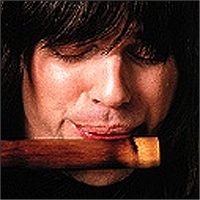Peter Phippen
// flautistPETER PHIPPEN is a world flutist from Eau Claire, Wisconsin, United States. “Book Of Dreams” (1996), “Echoes Of The Past” (1999), “Night Song” (2003), “Shadows Of Dawn” (2005), and “Grasslands” (2007) are all available from Canyon Records.
Website: www.peterphippen.com
Photo: John Running / PeterPhippen.com
Interview:
First of all, yes, I do believe music has a strong spiritual element. Actually, to me, music and spirituality are one in the same. If the human spirit is that part of us that transcends our physical being and connects us with a higher dimension, then music is the channel that carries us to that place. It has been said that melody is the voice of the spirit. Music can elevate mankind to high ideals, but it can also incite base desires and actions, perhaps because it is so closely tied to our emotional mechanism. Beethoven is quoted as saying “Music should strike fire from the hearts of men, and bring tears from the eyes of women”. Music is a powerful tool: it can breed fear and anxiety, or serenity and relief.
The manner in which a musician performs, however, makes all the difference as to whether or not the listener is able to connect with their spiritual self. There are two ways of playing music, technically or spiritually. When a highly-trained musician or composer plays their instrument, or composes a piece of music, you can often predict what is coming next. This type of musician is going to pause this long here, hit certain notes harder there, play a fast passage here, and so on. It was drilled into their head from an early age that this is the way music has to be. They are mentally involved in the “act” of playing. This technical music is only “interesting activity” from knowing how to play their instrument well. Lesser trained musicians, composers or self-taught musicians, in my opinion, will often come up with a more original sound in their music. It will not be the norm because they are breaking rules and because they can only be themselves. This is what creates a more original sound. If either type of these musicians, highly-trained or untrained, try to impress with their playing, composing or improvising, then that is not spiritual music. It is their self-indulgent egos speaking, and connection to anythingspiritual is blocked.
I know we all should be able to play at a competent level, and the more technique we have, the more we can forget about our technical ability when we venture into the “zone”, that state of being where we play our hearts out simply for the love of music. If by chance the music requires masterful technique, it is because it is called for by the unconscious flow of the music, not by the performer’s intentions. Johannes Brahms said, “Without craftsmanship, inspiration is a mere reed shaken in the wind”. There are some musicians who are a great balance of the two, and to me these are the world’s best musicians, composers, and improvisationalists.
If a musician plays because they must, because music is in their blood, in their soul, and they cannot live a day without playing with all of their being, then this person, in my opinion, is most likely playing “spiritual music”. The style of music they play is of no importance. I receive much of my musical inspiration from nature, and I believe there is a universal thread of the divine that vibrates in the air all around us every minute. If a musician can feel these vibrations, they will be inspired, and the music that results from this inspiration will connect the listener with the infinite.
“There is a universal thread of the divine that vibrates in the air all around us every minute.”
– Peter Phippen, flautist


